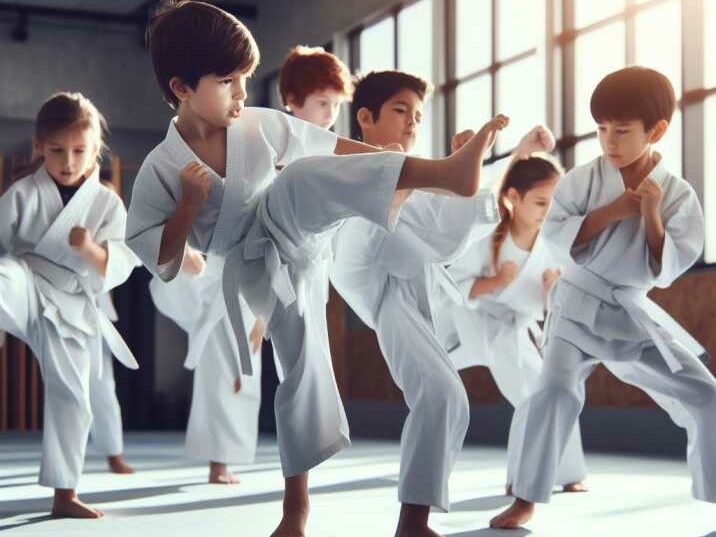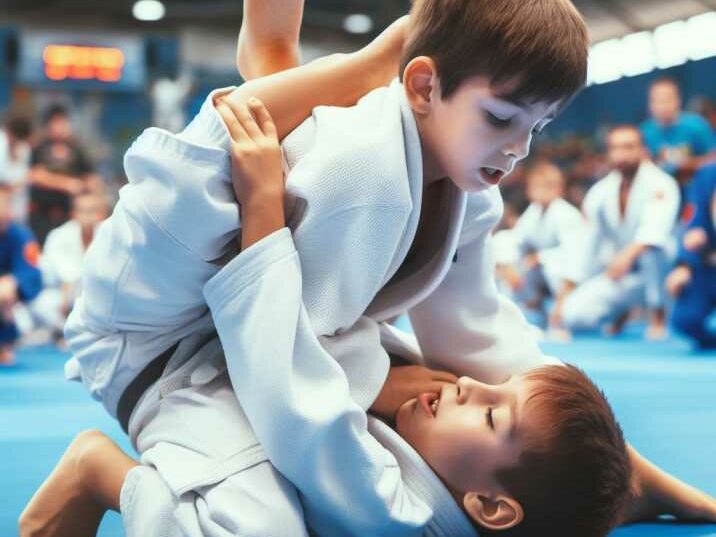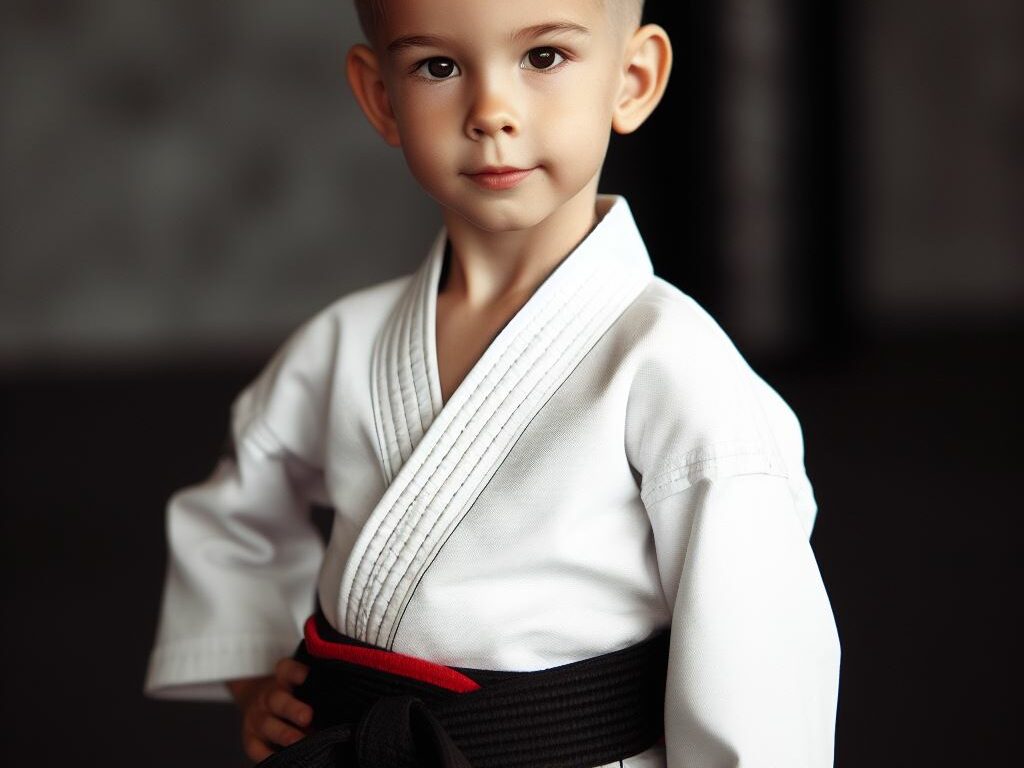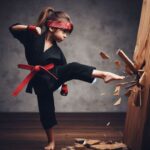Introduction
In today’s dynamic world, children face a multitude of challenges, from academic pressures to social interactions. These challenges can often manifest as behavioral issues in the classroom, affecting their learning and overall well-being. However, there exists a powerful tool that can help children navigate these challenges and cultivate positive behavior:
Kids martial arts is more than just a physical activity; it’s a holistic discipline that instills invaluable life skills, such as discipline, self-control, respect, and focus. When nurtured through martial arts training, these skills can have a profound impact on a child’s behavior in school, leading to improved academic performance, enhanced self-esteem, and stronger social interactions.

1. Discipline and Self-Control: Establishing a Foundation for Academic Excellence
At the core of martial arts lies discipline, the ability to follow rules, instructions, and expectations. Through repetitive drills and techniques, kids martial arts instills self-control, teaching children to manage their impulses and emotions effectively. This discipline and self-control translate into the classroom, where children can sit still, focus on their studies, and follow teachers’ instructions.
2. Self-Esteem and Confidence: Empowering Children to Thrive in School
Martial arts provides a platform for children to develop a positive self-image and a sense of accomplishment. As they master new techniques, progress through belt levels, and overcome challenges, their self-esteem grows. This newfound confidence spills over into the classroom, emboldening children to participate actively, ask questions, and contribute to class discussions.

3. Respect and Social Skills: Fostering a Harmonious Learning Environment
Martial arts emphasizes respect for oneself, instructors, peers, and opponents. Children learn to greet each other with courtesy, listen attentively, and resolve conflicts peacefully. These values translate into the classroom, fostering a more harmonious and respectful learning environment.
4. Focus and Concentration: Enhancing Academic Performance
The mental focus required for martial arts training is invaluable for school success. Children learn to concentrate on tasks at hand, block out distractions, and maintain mental clarity. This enhanced focus translates into improved academic performance, allowing children to grasp concepts more readily and complete assignments efficiently.
Choosing a Kids Martial Arts Program: Finding the Perfect Fit
When selecting a kids martial arts program, consider the following factors:
- Reputation and Experience: Choose a reputable school with experienced instructors who specialize in teaching children.
- Age-Appropriate Instruction: Ensure the program is tailored to the age and developmental level of your child.
- Positive and Supportive Environment: Look for a school that fosters a positive, inclusive, and supportive environment.
- Child’s Interest and Goals: Consider your child’s interests and goals when choosing a martial arts style.
Harnessing the Power of Kids Martial Arts: A Journey of Transformation
Kids martial arts offers a powerful avenue for fostering positive behavior and enhancing overall well-being in children. By instilling discipline, self-control, respect, and focus, martial arts empowers children to navigate school challenges effectively, leading to improved academic performance, enhanced self-esteem, and stronger social interactions. As children progress through their martial arts journey, they gain invaluable life skills that extend far beyond the dojo, shaping them into well-rounded individuals who thrive in all aspects of life.

Conclusion:
Embarking on a Path of Growth and Development
Kids martial arts offers a unique opportunity for children to develop essential life skills, cultivate positive behavior, and enhance their overall well-being. By providing a structured environment that promotes discipline, self-control, respect, and focus, martial arts empowers children to excel in school, build stronger social connections, and develop a sense of self-worth. As children progress through their martial arts journey, they embark on a path of growth and development that extends far beyond the dojo, shaping them into well-roundedtunesharemore_vert.
1. At what age can children start martial arts?
Children can start martial arts as early as 3 or 4 years old, depending on the program. Some schools have special classes for preschoolers that focus on basic motor skills and coordination. As children get older, they can progress to more advanced classes that teach self-defense techniques, sparring, and other martial arts skills.
2. What are the different types of martial arts for kids?
There are many different types of martial arts that are suitable for kids, including karate, taekwondo, judo, Brazilian Jiu-Jitsu, and Muay Thai. Each type of martial arts has its own unique style and philosophy, so it is important to choose a program that is a good fit for your child’s interests and needs.
3. What are the benefits of kids martial arts?
Kids martial arts offers a variety of benefits, both physical and mental. Physically, martial arts can help children develop strength, coordination, and flexibility. It can also improve their balance, agility, and cardiovascular fitness. Mentally, martial arts can help children develop discipline, self-control, and self-esteem. It can also teach them respect, focus, and how to deal with conflict peacefully.
4. How can I choose a kids martial arts program?
When choosing a kids martial arts program, it is important to consider the following factors:
- Reputation and experience: Choose a reputable school with experienced instructors who specialize in teaching children.
- Age-appropriate instruction: Ensure the program is tailored to the age and developmental level of your child.
- Positive and supportive environment: Look for a school that fosters a positive, inclusive, and supportive environment.
- Child’s interest and goals: Consider your child’s interests and goals when choosing a martial arts style.
5. How often should my child take martial arts classes?
The frequency of martial arts classes depends on the program and your child’s age and ability level. However, most schools recommend that children take at least two classes per week.
6. What should my child wear to martial arts class?
Children should wear comfortable clothing that allows them to move freely. They should also wear a belt if they have one.
7. What should I bring to my child’s first martial arts class?
You should bring your child’s martial arts uniform (if they have one), a water bottle, and a snack.
8. How long will it take my child to earn a black belt?
The amount of time it takes to earn a black belt varies depending on the program and your child’s dedication. However, it typically takes several years of consistent training.
9. What are some of the challenges of kids martial arts?
Some of the challenges of kids martial arts include:
- Discipline: Martial arts requires discipline and self-control, which can be difficult for some children.
- Physical demands: Martial arts can be physically demanding, which can be challenging for some children.
- Intimidation: Some children may be intimidated by the physical nature of martial arts.
10. How can I help my child overcome challenges in martial arts?
You can help your child overcome challenges in martial arts by:
- Encouraging them to practice regularly: Regular practice is essential for improvement in martial arts.
- Providing positive reinforcement: Praise your child for their efforts and accomplishments.
- Helping them set goals: Set achievable goals for your child and help them track their progress.
- Be patient: It takes time to develop the skills and discipline required for martial arts.
11. What are some of the benefits of martial arts for kids with ADHD?
Martial arts can be a helpful intervention for kids with ADHD. It can help them develop focus, concentration, and self-control. It can also provide them with a healthy outlet for their energy.
12. What are some of the benefits of martial arts for kids with autism?
Martial arts can be a beneficial therapy for kids with autism. It can help them develop social skills, improve communication, and build self-confidence.
13. What are some of the benefits of martial arts for girls?
Martial arts can be a great way for girls to learn self-defense, develop confidence, and build strength. It can also teach them important life skills such as discipline, respect, and perseverance.
14. What are some of the benefits of martial arts for boys?
Martial arts can be a helpful way for boys to learn self-discipline, develop respect for others, and manage their emotions. It can also provide them with a healthy outlet for their energy.


